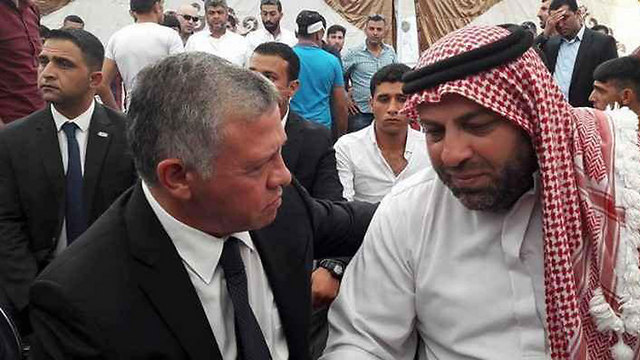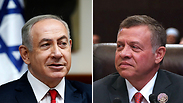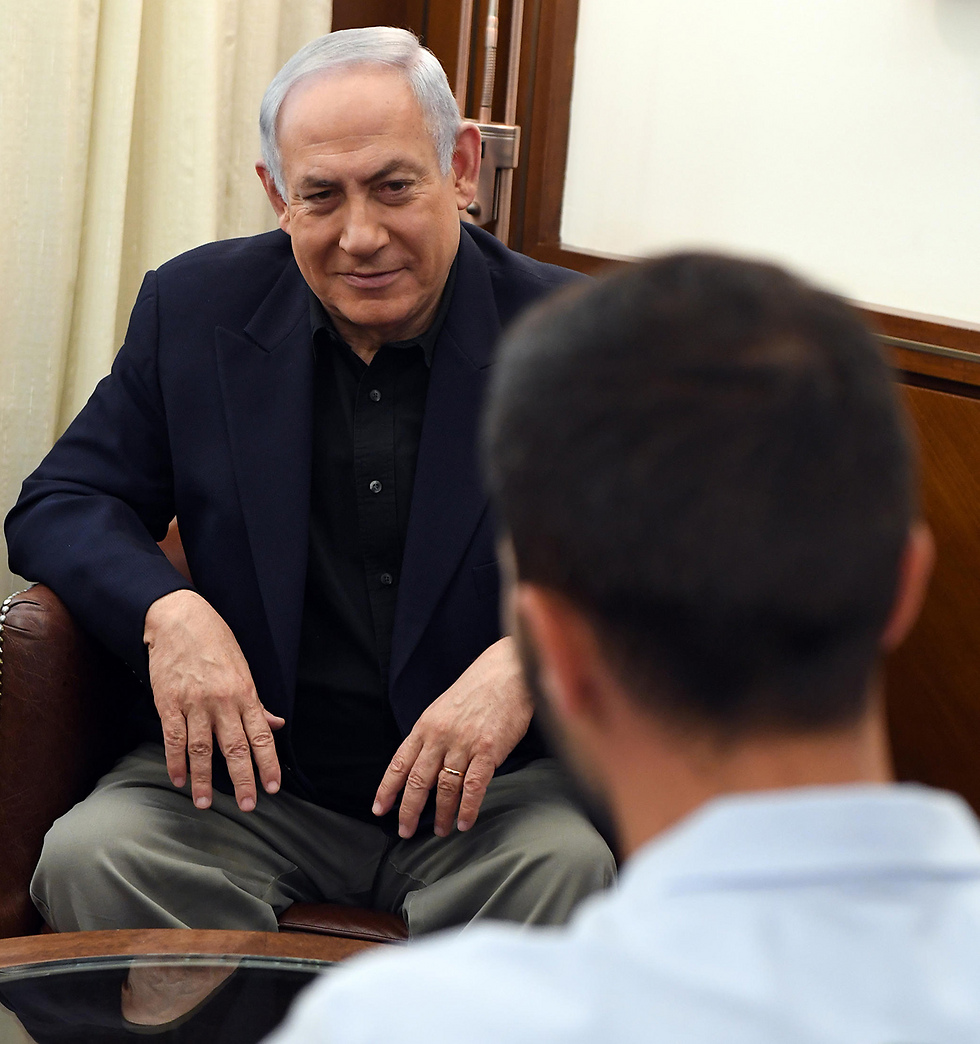
Jordan king criticizes Israel's 'provocative' action
King Abdullah II rebukes Israel's 'unacceptable and provocative behavior' following fatal shooting at Israeli embassy in Amman that left 2 Jordanians dead; Abdullah adds PM Netanyahu, who praised Israeli guard who fired at Jordanians after one attacked him, needs to guarantee legal action, and that incident 'will have direct impact on nature of our relations.'
Jordanian King Abdullah II issued a statement following what he described as Israel's "unacceptable and provocative behavior" in connection with the deadly shooting incident at the Israeli embassy in Jordan, last Monday.
During Monday's incident, an Israeli security guard shot and killed two Jordanians after one of them, a 16-year-old, attacked him with a screwdriver The second Jordanian was a landlord, and it remains unclear what if any role he played in the attack.
Israel's embassy staff, including the guard, left for Israel a day after the shooting. The incident has inflamed public opinion in Jordan where a 1994 peace treaty with Israel remains deeply unpopular.
Israeli Prime Minister Benjamin Netanyahu praised the guard upon his return, saying he had acted "calmly." Netanyahu also took created a photo opportunity, as cameras snapped shots of him embracing the security guard pon his return to Israel.
Jordan's King Abdullah II told senior officials on Thursday that Netanyahu needs to take legal measures that "guarantee the trial of the murderer."
He said the incident "will have a direct impact on the nature of our relations."
Meanwhile, Jordanian Attorney General Akram Masa'a stated Thursday that the State Prosecutor's Office had completed its investigation into the incident at the Israeli Embassy, and that "the prosecution attributed a murderer called 'Ziv' (the Israeli security guard who shot and killed the two Jordanians—ed) to the charge of killing more than one person and holding firearms without a permit."
The prosecutor added that an investigation found that the Israeli security guard receives diplomatic and legal immunity. However, "The immunity he enjoys in accordance with the Vienna Convention is only procedural immunity that does not exempt him from trials before international courts."
The prosecutor further stated that the State Attorney's Office had forwarded the investigation documents to the Israeli Minister of Justice Ayelet Shaked, who was to contact the Foreign Ministry to send the documents to the relevant legal authorities in Israel: "This is to prosecute the murderer mentioned in Article 31 of the Vienna Convention," stated Masa'a.
The Jordanian incident comes following almost two weeks of rioting and protests in Israel and the Palestinian Authority, over Israel's decision to erect additional security measures at the Temple Mount site, considered to be holy to both Muslims and Jews. After Israel acquiesced and removed the security measures on Thursday, thousands of Muslims flocked to the site for the first organized prayers in almost two weeks.

Upon entering the Temple Mount, Palestinians mounted the roof of the Al-Aqsa Mosque, located at the compound, and waved their national flag in celebration.
Muslim officials had called for a boycott of prayers at the compound, known to Muslims as the Noble Sanctuary and Jews as the Temple Mount, because of the measures.
Rival Palestinian factions Hamas and Fatah both called for mass protests Friday in east Jerusalem and the West Bank..
Israeli police remain on high alert around Jerusalem's Old City ahead of the first Muslim prayers at a contested holy site since controversial security measures were removed.
Muslim leaders told the faithful to return to praying at the site, known to Muslims as the Noble Sanctuary and to Jews as the Temple Mount, after a week of protests over metal detectors and cameras put in place following a deadly attack on Israeli police officers.
Israel's police chief Roni Alsheikh told reporters that metal detectors and cameras were removed in compliance with a decision by the Israeli Cabinet, and that police have been given the necessary resources to protect all visitors and worshippers to the shrine.
Jordan has welcomed Israel's removal of security installations at a contested Jerusalem shrine, saying that as an occupying power "Israel has no right to impose" changes on the ground.
Jordanian Government spokesman Mohammed Momani's statement Thursday came after Israel removed metal railings and scaffoldings. Jordan is the Muslim custodian of the shrine—the third holiest site of Islam and the most sacred on in Judaism.
Momani says dismantling the devices was needed to calm the situation.
Israel installed metal detectors, additional security cameras and other devices last week after Arab gunmen killed two police officers there in mid-July.
Muslims alleged the security measures were an attempt by Israel to expand control over the shrine, a claim Israel denies. The dispute sparked widespread Muslim protests.
A senior Islamic leader in Jerusalem is urging Muslims to skip prayers in neighborhood mosques on Friday and pray en masse at a major Jerusalem shrine at the center of weeks of tensions.
Abdel Azim Salhab, of the Waqf, Jordan's religious body that administers the site, said "we call on Imams to close all mosques in Jerusalem Friday in order for all worshippers to pray Friday prayer in al-Aqsa mosque only."
Friday prayers are the highlight of the Muslim religious week. Thousands of Muslims from around the country and Palestinian areas typically worship at the holy compound in Jerusalem's Old City.
Muslims have been praying in the streets outside the shrine to protest Israeli security measures outside entrances to the site that were put in place following a deadly Palestinian shooting assault there earlier this month.
The Waqf official spoke Thursday after Muslim officials told the faithful to return to pray inside the site, holy to both Muslims and Jews, after Israel removed the security devices.
A senior member of Benjamin Netanyahu's coalition government has criticized Israel's dismantling of security devices outside a major Jerusalem shrine.
Education Minister Naftali Bennett warned that Israel's capitulation could spell more violence.
He told Army Radio that "every time the state of Israel folds in a strategic way we get hit with an Intifada. You seemingly benefit in the short term but in the long term you harm deterrence."


















